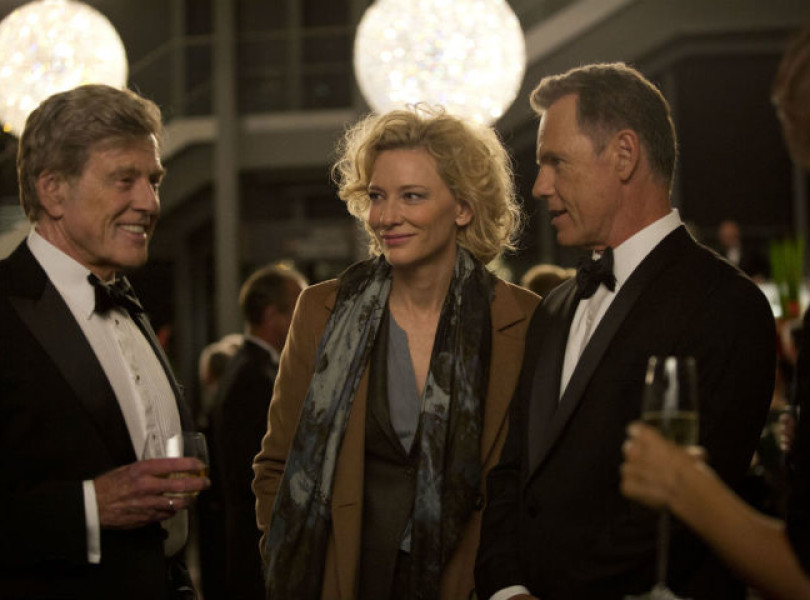Fact or fiction, truth or lie, this journalism drama starring Robert Redford and Cate Blanchett will make you think.
By Josh Lasser
Robert Redford starring in a film about a reporter trying to track down whether or not the President of the United States has illegal activity (now or in the past) makes for some easy parallels. This is true even when Redford is a reporter—not the reporter—at the center of the tale, and it is also exactly what one finds with James Vanderbilt’s directorial debut, Truth.
Rather than Redford’s Dan Rather being at the center of Truth, it is Cate Blanchett’s Mary Mapes. As the film is based on Mapes’ book about the 60 Minutes report on George W. Bush’s National Guard activity, this makes complete sense. Redford’s Rather doesn’t come off badly, but he does come off as a hard-drinking news anchor who is brought in at the last minute to be the on-camera guy as opposed to doing the legwork himself. Mapes bounces thoughts off of Rather and has some discussions with him about the story, but he is depicted more as an institution who may be past his prime and who isn’t in control of either the story he’s telling nor the firestorm it causes.
The truth, as presented, is that no one is in control of the firestorm and that the person delving into the story, Mapes, isn’t in control of that either. It is a questioning and contemplative and at times smart film, even if it has a tendency to preach.
We want to hear it.
Taking a step back, Truth follows Mapes, a producer for 60 Minutes. Taking place in 2004, Mapes has part of a story about President George W. Bush’s time in the National Guard years earlier and how a contact of his at that time may have had ties to the Bin Laden family who, in turn, may have helped finance Bush’s oil company once he left the guard. And if that’s too much to unpack, not to worry, it soon goes away in favor of a better story – that George W. Bush may not have been actively serving in the National Guard when he was supposed to be.
The Presidential election is coming quickly, and Mapes—along with her team of Lucy Scott (Elisabeth Moss), Mike Smith (Topher Grace), and Lt. Colonel Roger Charles (Dennis Quaid)—put the pieces of the Guard tale together. They air the story on 60 Minutes II and after that, the facts are called into question. The next bit is only a spoiler if you don’t remember recent history – Mapes is investigated by CBS, the network retracts the story, and Rather is forced to step down.
How one feels about all of this, and much of the movie, is something of a Rorschach Test. As the movie offers the tale, Mapes is lied to by a source, has another source hedge, and is under a time crunch inflicted upon her from a network which is bumping the show two weeks in a row, first for Billy Graham and then Dr. Phil. She is one person, with a team, struggling against the odds as she attempts to fight the good fight.
And if that all sounds a little over-the-top and pompous, it’s because Truth is a little over-the-top and pompous. It is highly emotional and very stirring, but part of that is because of rousing discussions about the power of investigative journalism and the evil of corporations in politics and vice versa.
It would actually be far more than a little over-the-top if Blanchett weren’t fantastic in the part. She brings a depth of emotion and fullness to a film where nearly every other character (with the exception of Stacey Keach’s Lt. Colonel Bill Burkett) is flat. The script certainly favors Blanchett, but the performance is still winning.
What the script can’t do is offer that which the title declares – truth. Finish the movie and one is no closer to knowing whether or not Bush did serve in the Guard, whether CBS let themselves be influenced by politics, and whether the memos which were one part of Mapes’ story but the entire argument against it were real or a forgery. We see mistakes made by everyone at every level, Mapes included, but get no answers.
Rather than seeming investigative itself, the movie feels much more like an indictment of what Mapes went through when she was accused of airing a story of which she was, maybe, unsure. Truth then, like Mapes’ report at its center, leaves the audience needing to do the verification on their own.
Truth winds up feeling very much like a funhouse mirror version of All the President’s Men, and more than that, suggesting we now live in that funhouse world. Bob Woodward (or Redford anyway) is even there, but he’s the once great reporter who broke so much news, not the one doing it today. As such, it is a condemnation of our world and our media just a few decades on from that media’s greatest triumph. It will certainly make one wonder.




